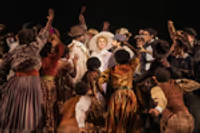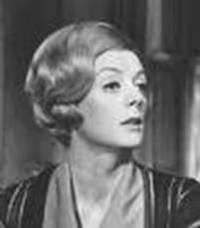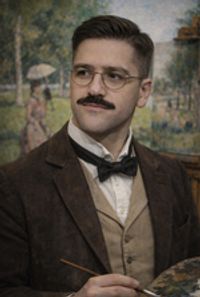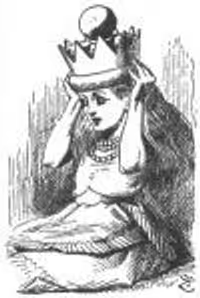Lea Michele … Fanny Replacement.
#25Lea Michele … Fanny Replacement.
Posted: 11/8/22 at 12:43pm
I have to say that I underestimated Lea Michele's box office power when she was first announced. I thought the first few weeks of her run would do well and then it would taper off... Glad to have been proven wrong. The stakes were high as hell when Michele went into this production. There was no room for her to be anything but an absolute revelation in the role, and it sounds like she has more than delivered. I look forward to seeing her for myself next weekend.
#26Lea Michele … Fanny Replacement.
Posted: 11/8/22 at 2:10pm
hearthemsing22 said: "Do you honestly think they'd do a tour??"
If they get close to recouping, but don’t they might as well recovering their losses on a tour.
#27Lea Michele … Fanny Replacement.
Posted: 11/8/22 at 2:43pm
Am I not correct in saying that the capitalization for a tour is completely separate from the capitalization for a Broadway production? Not to say that some of the same investors may not be involved in both, but it is separate, yes?
Jarethan
Broadway Legend Joined: 2/10/11
#28Lea Michele … Fanny Replacement.
Posted: 11/8/22 at 3:25pm
Yes, they are separate investments, although I would imagine that original investors must have first right of
#29Lea Michele … Fanny Replacement.
Posted: 11/8/22 at 5:00pm
Sutton Ross said: "Also, the actress does not need to be Jewish to play the part."
I think you'll find that there are lots of people who disagree! This role means a lot to many people, so this something that's strongly desired.
#30Lea Michele … Fanny Replacement.
Posted: 11/8/22 at 6:17pm
R. GreenFinch said: "Sutton Ross said: "Also, the actress does not need to be Jewish to play the part."
I think you'll find that there are lots of people who disagree! This role means a lot to many people, so this something that's strongly desired."
What it needs is someone that can sing the heck out of it. Katherine Mcphee and her husband are there tonight.
ManOfLaMuncha
Stand-by Joined: 6/17/22
#31Lea Michele … Fanny Replacement.
Posted: 11/8/22 at 6:51pm
R. GreenFinch said: "Sutton Ross said: "Also, the actress does not need to be Jewish to play the part."
I think you'll find that there are lots of people who disagree! This role means a lot to many people, so this something that's strongly desired."
The real Fanny singing my favorite of hers
https://www.youtube.com/watch?v=d_c7Y_V-TJw
#32Lea Michele … Fanny Replacement.
Posted: 11/11/22 at 12:59pm
Robbie2 said: "EDSOSLO858 said: "Nobody. The show will probably close on a high at the end of Michele's contract."
Heard from an industry friend that she may extend after her 6 month contract ends in March for another 3 months"
Tickets are now on sale through May 28, 2023, so 2 months, for now.
#33Lea Michele … Fanny Replacement.
Posted: 11/11/22 at 1:19pm
To the person who sent me a PM asking where to find tickets after March, your account doesn't accept PM's, so I couldn't reply.
The tickets are available on SeatGeek. Just keep expanding the calendar:
https://seatgeek.com/funny-girl-tickets
Penna2
Broadway Star Joined: 2/24/18
#34Lea Michele … Fanny Replacement.
Posted: 11/11/22 at 1:37pm
hearthemsing22 said: "Well that also brings up the question-who would replace Ramin? I think he's going to London to do...something. Maybe they'll bump up understudies for Nick? In regards to Lea...no idea. Her contract is through March, right? Maybe if they're still doing well they'd consider a replacement...I honestly have no clue who could replace her and keep the show going. What if Parade transfers and Michaela goes with it?"
He has a one-day concert in May in the UK - Dr. Zhivago. He is also scheduled for a couple of one-day concerts in Ft. Lauderdale and Scottsdale at the end of February (on the same weekend). The Playbill Alaskan cruise is in July. Nothing that would interfere with him continuing if he's agreeable, I hope he is. Glad he's able to play Nicky with an amazing Fanny.
#35Lea Michele … Fanny Replacement.
Posted: 11/11/22 at 2:05pm
R. GreenFinch said: "Sutton Ross said: "Also, the actress does not need to be Jewish to play the part."
I think you'll find that there are lots of people who disagree! This role means a lot to many people, so this something that's strongly desired."
Im sure there are but a person's religion shouldn't have anything to do with giving life to any role, singing the score beautifully and the ability to crush it nightly. Lea was raised in the Catholic church and she is a billion times better than the person who originated the role earlier this year. She becomes Fanny right before your eyes and is stunning. Also, it's about money and getting people in the seats which she does 7 times a week.
Theatrefanboy1
Broadway Legend Joined: 8/2/15
#36Lea Michele … Fanny Replacement.
Posted: 11/13/22 at 8:52am
I wonder how willing Lea would be to have multiple extensions. This is a role fit like a glove for her. The ticket sales have been great. She has a modified performance schedule. I wonder if she’d stay through the summer. Close down in the fall.
#37Lea Michele … Fanny Replacement.
Posted: 11/13/22 at 10:11am
I'm Jewish and don't care at all if the actor playing Fanny is Jewish. I'm also, and not parenthetically, like the great majority of American Jews, Ashkenazi Jewish.
All I care about is that the actor cast is wonderful and authentically plays Fanny both as a personality and as a stage personality. Which Michele does with flying colors.
But when we discuss Fanny Brice's Jewish identity as a woman and as a comedienne we are invariably discussing Fanny Brice's Ashkenazi Jewish identity.
Brice's cultural identity is Ashkenazi. Her parents came from Hungary and the Alsace. Her comedy came from a specific tradition that is essentially Ashkenazi. That may mean a great deal to many people.
As it happens, Leah Michele is not an Ashkenazi Jew. Her mother is Italian whose ancestors are from Rome and Naples, and a Roman Catholic. Her dad is a Sephardi Jew whose ancestors are from Thessalonika, Greece. Michele was religiously raised as a Roman Catholic. Her ancestral cultural background is Mediterranean, highly distiguishable from Fanny Brice's central European roots, especially when it comes to the tradition in which Brice performed comedy.
Ashkenazi and Sephardi cultures are very different. Brice's ethnic qualities as a performer might be quintessentially described as "Yiddish," in a very specific theatrical sense, referring to the Germanic Asheknazi culture and language, not the Romance/Med. Sephardic/Ladino.
That Michele's roots are very different than Brice's ultimately means, forgive me, bupkis. Or in Ladino, poco.
What means a lot is that Michele is captivating as Fanny.
She is.
#38Lea Michele … Fanny Replacement.
Posted: 11/13/22 at 12:32pm
henrikegerman said: "I'm Jewish and don't care at all if the actor playing Fanny is Jewish. I'm also, and not parenthetically, like the great majority of American Jews, Ashkenazi Jewish.
All I care about is that the actor cast is wonderful and authentically plays Fanny both as a personality and as a stage personality. Which Michele does with flying colors.
But when we discuss Fanny Brice's Jewish identity as a woman and as a comedienne we are invariably discussing Fanny Brice's Ashkenazi Jewish identity.
Brice's cultural identity is Ashkenazi. Her parents came from Hungary and the Alsace. Her comedy came from a specific tradition that is essentially Ashkenazi. That may mean a great deal to many people.
As it happens, Leah Michele is not an Ashkenazi Jew. Her mother is Italian whose ancestors are from Rome and Naples, and a Roman Catholic. Her dad is a Sephardi Jew whose ancestors are from Thessalonika, Greece. Michele was religiously raised as a Roman Catholic. Her ancestral cultural background is Mediterranean, highly distiguishable from Fanny Brice's central European roots, especially when it comes to the tradition in which Brice performed comedy.
Ashkenazi and Sephardi cultures are very different. Brice's ethnic qualities as a performer might be quintessentially described as "Yiddish," in a very specific theatrical sense, referring to the Germanic Asheknazi culture and language, not the Romance/Med. Sephardic/Ladino.
That Michele's roots are very different than Brice'sultimately means, forgive me, bupkis. Or in Ladino, poco.
What means a lot is that Michele is captivating as Fanny.
She is.
"
I am in agreement with every word of this. Also.. I don't care who they cast.. if they make me feel and experience things like Lea does in that theater... BRING IT ON!
PipingHotPiccolo
Broadway Legend Joined: 6/13/22
#39Lea Michele … Fanny Replacement.
Posted: 11/13/22 at 12:43pm
i could care less if the actress playing Fanny is Jewish; its acting. Either it works or it doesn't.
BUT it never fails to amaze me how many people apply this theory to non-Jews playing Jews only. TDF just got sued for essentially firing two white ASL interpreters at the Lion King because they were white and couldn't interpret Black characters. Now yes that is particularly stupid/offensive since the Black characters here are all, you know, lions and meerkats, but we've seen this again and again, a policing of who is representing who in which roles. And while I very much understand that impulse, when it comes to an explicitly Jewish woman, that impulse disappears among many (usually under the guise of "Judaism is just a religion, nothing more" that old ugly canard).
Jarethan
Broadway Legend Joined: 2/10/11
#40Lea Michele … Fanny Replacement.
Posted: 11/13/22 at 2:19pm
henrikegerman said: "I'm Jewish and don't care at all if the actor playing Fanny is Jewish. I'm also, and not parenthetically, like the great majority of American Jews, Ashkenazi Jewish.
All I care about is that the actor cast is wonderful and authentically plays Fanny both as a personality and as a stage personality. Which Michele does with flying colors.
But when we discuss Fanny Brice's Jewish identity as a woman and as a comedienne we are invariably discussing Fanny Brice's Ashkenazi Jewish identity.
Brice's cultural identity is Ashkenazi. Her parents came from Hungary and the Alsace. Her comedy came from a specific tradition that is essentially Ashkenazi. That may mean a great deal to many people.
As it happens, Leah Michele is not an Ashkenazi Jew. Her mother is Italian whose ancestors are from Rome and Naples, and a Roman Catholic. Her dad is a Sephardi Jew whose ancestors are from Thessalonika, Greece. Michele was religiously raised as a Roman Catholic. Her ancestral cultural background is Mediterranean, highly distiguishable from Fanny Brice's central European roots, especially when it comes to the tradition in which Brice performed comedy.
Ashkenazi and Sephardi cultures are very different. Brice's ethnic qualities as a performer might be quintessentially described as "Yiddish," in a very specific theatrical sense, referring to the Germanic Asheknazi culture and language, not the Romance/Med. Sephardic/Ladino.
That Michele's roots are very different than Brice'sultimately means, forgive me, bupkis. Or in Ladino, poco.
What means a lot is that Michele is captivating as Fanny.
She is.
"
You are mega-over-analyzing the topic. Who cares if LM is of the same ancestry as Fannie Brice as long as she can give the performance she is giving. There is no question that Fanny is Jewish. The person playing Fanny Brice needs to be convincing playing a Jewish character, especially one who emphasized her Jewish roots in her performances.
I personally don't care if she is Jewish as long as she can give a convincing performance as a Jew. I will also acknowledge that I think that we SOMETIMES get carried away arguing whether a straight person should be allowed to play a gay character or a light colored Black person should be allowed to play someone who was darker.
jimmycurry01
Broadway Legend Joined: 5/28/05
#41Lea Michele … Fanny Replacement.
Posted: 11/13/22 at 2:37pm
Jarethan said: "henrikegerman said: "I'm Jewish and don't care at all if the actor playing Fanny is Jewish. I'm also, and not parenthetically, like the great majority of American Jews, Ashkenazi Jewish.
All I care about is that the actor cast is wonderful and authentically plays Fanny both as a personality and as a stage personality. Which Michele does with flying colors.
But when we discuss Fanny Brice's Jewish identity as a woman and as a comedienne we are invariably discussing Fanny Brice's Ashkenazi Jewish identity.
Brice's cultural identity is Ashkenazi. Her parents came from Hungary and the Alsace. Her comedy came from a specific tradition that is essentially Ashkenazi. That may mean a great deal to many people.
As it happens, Leah Michele is not an Ashkenazi Jew. Her mother is Italian whose ancestors are from Rome and Naples, and a Roman Catholic. Her dad is a Sephardi Jew whose ancestors are from Thessalonika, Greece. Michele was religiously raised as a Roman Catholic. Her ancestral cultural background is Mediterranean, highly distiguishable from Fanny Brice's central European roots, especially when it comes to the tradition in which Brice performed comedy.
Ashkenazi and Sephardi cultures are very different. Brice's ethnic qualities as a performer might be quintessentially described as "Yiddish," in a very specific theatrical sense, referring to the Germanic Asheknazi culture and language, not the Romance/Med. Sephardic/Ladino.
That Michele's roots are very different than Brice'sultimately means, forgive me, bupkis. Or in Ladino, poco.
What means a lot is that Michele is captivating as Fanny.
She is.
"
You are mega-over-analyzing the topic. Who cares if LM is of the same ancestry as Fannie Brice as long as she can give the performance she is giving. There is no question that Fanny is Jewish. The person playing Fanny Brice needs to be convincing playing a Jewish character, especially one who emphasized her Jewish roots in her performances.
I personally don't care if she is Jewish as long as she can give a convincing performance as a Jew. I will also acknowledge that I think that we SOMETIMES get carried away arguing whether a straight person should be allowed to play a gay character or a light colored Black person should be allowed to play someone who was darker."
You clearly missed the entire point being made there. Reread it.
#42Lea Michele … Fanny Replacement.
Posted: 11/13/22 at 6:13pm
Highly doubt they will replace Lea Michele in FG. She will extend and then it will close.
Jarethan
Broadway Legend Joined: 2/10/11
#43Lea Michele … Fanny Replacement.
Posted: 11/14/22 at 3:04pm
jimmycurry01 said: "Jarethan said: "henrikegerman said: "I'm Jewish and don't care at all if the actor playing Fanny is Jewish. I'm also,
What means a lot is that Michele is captivating as Fanny.
She is.
"
You are mega-over-analyzing the topic. Who cares if LM is of the same ancestry as Fannie Brice as long as she can give the performance she is giving. There is no question that Fanny is Jewish. The person playing Fanny Brice needs to be convincing playing a Jewish character, especially one who emphasized her Jewish roots in her performances.
I personally don't care if she is Jewish as long as she can give a convincing performance as a Jew. I will also acknowledge that I think that we SOMETIMES get carried away arguing whether a straight person should be allowed to play a gay character or a light colored Black person should be allowed to play someone who was darker."
You clearly missed the entire point being made there. Reread it."
You are right… I did t read it well enough…incorrectly thought it was an argument for rigid casting, which I am tired of. Thanks for pointing out my misread. Older folks will appreciate my Emily Latella ‘never mind.’
OldTheatreLover
Chorus Member Joined: 12/21/09
#44Lea Michele … Fanny Replacement.
Posted: 11/15/22 at 8:34pm
Jarethan said: "The fact that Streisand never got a Tony for playing Fanny could present an issue. Even there, however, I guess one could argue that she did get a Tony for Funny Girl since there was no other reason to give her a special Tony, since the last time she was on a Broadway stage was when she left Funny Girl, and no one was going to give her one for I Can Get It for You Wholesale."
Streisand was in fact nominated for a Tony for Wholesale.
Malinda5000
Stand-by Joined: 6/19/16
#46Lea Michele … Fanny Replacement.
Posted: 11/16/22 at 3:48pm
Jarethan said: "jimmycurry01 said: "Jarethan said: "henrikegerman said: "I'm Jewish and don't care at all if the actor playing Fanny is Jewish. I'm also,
What means a lot is that Michele is captivating as Fanny.
She is.
"
You are mega-over-analyzing the topic. Who cares if LM is of the same ancestry as Fannie Brice as long as she can give the performance she is giving. There is no question that Fanny is Jewish. The person playing Fanny Brice needs to be convincing playing a Jewish character, especially one who emphasized her Jewish roots in her performances.
I personally don't care if she is Jewish as long as she can give a convincing performance as a Jew. I will also acknowledge that I think that we SOMETIMES get carried away arguing whether a straight person should be allowed to play a gay character or a light colored Black person should be allowed to play someone who was darker."
You clearly missed the entire point being made there. Reread it."
You are right… I did t read it well enough…incorrectly thought it was an argument for rigid casting, which I am tired of. Thanks for pointing out my misread. Older folks will appreciate my Emily Latella ‘never mind.’"
thanks, Jarethan
appreciate it and the Emily "never mind"
Malinda5000
Stand-by Joined: 6/19/16
#48Lea Michele … Fanny Replacement.
Posted: 11/29/22 at 10:35am
Papi2013 said: "R. GreenFinch said: "Sutton Ross said: "Also, the actress does not need to be Jewish to play the part."
I think you'll find that there are lots of people who disagree! This role means a lot to many people, so this something that's strongly desired."
What it needs is someone that can sing the heck out of it. Katherine Mcphee and her husband are there tonight. "
I wonder if Kat McPhee is eyeing this for her next theatrical venture. History shows she’s not above being a Broadway replacement.
#49Lea Michele … Fanny Replacement.
Posted: 11/29/22 at 10:40am
The only person I can think of who might replace, would be right for the role and would sell tickets the way Lea Michele would is Sara Bareillas
Videos













